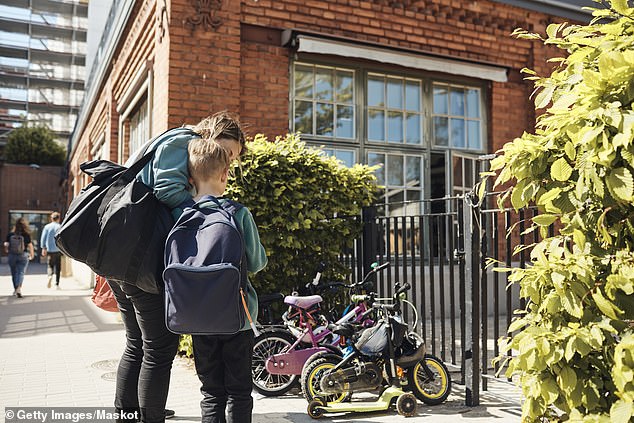The end of the half term holiday may come as a big relief to many parents, but it can also be a huge worry if you feel your child is still not settled in their school.
A few weeks of nerves at the start of a new school year are perfectly normal, but for some children the anxiety around drop-off or the school day itself continues for much longer – and it can be hugely stressful for parents, who of course only want the best for their kids.
So what should you do if school remains a battleground a couple of months in? We spoke to child psychologist Dr Cleo Williamson, and Georgia Dayton and Zoe Hardman, co-hosts of the Made by Mammas podcast, for their advice.
What should you do if your child is struggling to leave you at the start of the school day?
Drop-off can be a particular flashpoint when it comes to childhood anxiety, although it’s worth finding out how long this upset continues after you leave. ‘We’ve learnt over the years that nine times out of ten, once they get through the school gates, they’re fine, but that’s not always helpful when you have a child screaming and grabbing onto you,’ says Dayton.

Drop-off is a common time for children’s anxiety to flare.
Williamson agrees: ‘If your child finds separation at the school gate difficult, the best starting point is to talk with staff about what happens at drop-off and once they’re inside. Do they settle quickly, need one-to-one reassurance, or stay withdrawn? Understanding this helps tailor support and ensures school and home are working together.
‘Reflect on how your child has managed previous transitions and remember that every child’s temperament is different. If prolonged goodbyes heighten distress, keep them short and consistent; if your child needs more reassurance, explore if your school is open to making small adjustments such as earlier or slightly later drop-offs.’
All our experts agree that keeping the start of the day as calm as possible is key. ‘Starting the morning as calmly as possible always seems to get things off on the right foot, whether that’s having a good chat at breakfast or taking a slower paced walk to school,’ say the Made by Mammas hosts. ‘If everything feels calm (even if you’re a nervous wreck inside), it usually helps keep emotions stable. Reiterate all the positives about going to school, give lots of hugs, but then be firm and walk away. Breathe, and at least wait until you get around the corner to cry yourself! It really does get easier, bit by bit. We also think walking in with a friend can really help.’
How can you help your kids form friendships if they struggling?
‘We talk about this on the podcast so much, and we’ve come to realise that often our fears around them forming friendships stem more from parents’ expectations than from the kids themselves,’ says Hardman. ‘Some children take longer to form friendships, and how great is that? To be so selective about who they want to spend their time with is an amazing trait. That said, when our kids have been upset or unsure about how to make new friends, we’ve found that acting it out with teddies and talking about what friendships are, how friends treat each other etc. can help. If they struggle to make friends in groups, arrange playdates where they can have more one-on-one time.
Williamson agrees that allowing your child to socialise in smaller groups is a good route to helping them with friendships. ‘Organising small playdates with one or two classmates at home can make a big difference, allowing children to build familiarity and confidence in a setting where they feel secure,’ she says. ‘Teachers can often advise who your child naturally gravitates towards, helping you nurture those early connections.’
‘It’s also worth remembering that many young children still engage mostly in parallel play, playing alongside rather than directly with others and this is perfectly normal. These early interactions lay the groundwork for more reciprocal friendships as social understanding develops. Building social comfort in small steps is far more effective than forcing interaction or expecting instant closeness.’
What are your top tips for reducing stress before you leave the house?
‘Calm, predictable mornings make a huge difference to how children approach the school day. Waking up with enough time to get ready without rushing helps reduce anxiety and resistance,’ says Williamson.
This starts from the night before: ‘A consistent bedtime routine supports this by ensuring your child is well rested,’ says Williamson, while the Made by Mammas hosts recommend organising as much as possible the previous evening. ‘It’s boring, but get everything ready the night before,’ they say. ‘The less rushed and frantic, the better. Hang the uniform all together and make sure they get dressed before doing anything else, that way, you know you can rush out the door if you need to. We’re both working full time so we try to be as organised as possible ahead of the start of the week.’

Tackling the period before you arrive at the school gate can make a huge difference to stress levels on arrival.
As for the morning itself, ‘Try to avoid screens before school, while they provide an appealing distraction, they often make transitions harder when it’s time to switch off and leave,’ advises Williamson. ‘Instead, set out a quiet, engaging activity or a favourite toy to ease the morning flow. Visual timetables or checklists can also help children feel in control and confident about what comes next. Establishing these routines gradually fosters a sense of security, allowing the focus to move from stress and hurry to calm readiness.’
How can you help a shy child cope with school overwhelm?
‘For shy or sensitive children, the social and sensory demands of school can feel exhausting. It’s important to build in recovery time at the end of the day. Try to avoid overscheduling and give your child time to rest and recharge, ideally with low-pressure activities such as building, drawing, or simply watching a favourite show together. Home should be a space where they can relax without needing to perform socially, so that they have the energy to manage school as best they can,’ says Williamson.
The last thing you want is for your shy child to feel that their reticence is weird, so talk it out, ‘As with everything, support them with how they feel and normalise it,’ says Dayton. ‘Talk about situations when they might feel nervous or hesitant, and give examples of times you’ve felt that way and how you handled it. With younger kids, we’ve always found that talking positively to their teddies, toys, or dolls about them, in front of them can really help.’

For shy or sensitive children, the social and sensory demands of school can feel exhausting, says Williamson.
How can you help your child build their confidence?
Taking it slow and celebrating the small wins is key, says Williamson. ‘Children may find it hard to settle for a range of reasons, including tiredness, sensory overload, or separation anxiety,’ she says. ‘Changes at home, such as a new sibling or family stress, can also affect how secure they feel at school. It’s worth remembering that early resistance doesn’t always signal a serious problem; it often reflects a child’s developing capacity to manage new expectations and environments. Consistency, reassurance, and collaboration between home and school are key. Keeping routines steady, celebrating small successes, and allowing plenty of rest and play can all help a child build resilience and confidence.’
The Made by Mammas hosts have a bedtime tip to share too: ‘It sounds simple, but just talk to them. Find a time of day that works, when it’s not rushed. We find that getting into bed with our kids at the end of the day and talking about anything that’s upset them, confused them, or made them happy really helps them navigate situations that come up at school and handle them with confidence. Always be your child’s biggest cheerleader, it might feel OTT, but tell them how great they are. Talk about their qualities: how kind, funny, and wonderful they are.’









